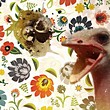|
|

SOT We've presented quite a few Norwegian trios pointing in different directions in earlier menus this year, like MoE last full moon, Freedumb, Building Instrument, Hedvig Mollestad Trio Monkey Plot and Oriental Sunshine earlier on. And here is another one, with a highly original line-up that includes a self-constructed tuba, called tubmarine! (I wonder if it's yellow ...) SOT might mean Society Of Toxicology, but here it's an abbreviation for Salt Of Tusj (tusj is the Norwegian word for indian ink, although that probably won't make you any enlightened; me neither). Sot is Norwegian for soot, that might explain why there are photos of the band members dressed as old fashioned chimney sweepers with black garments, top hats and sooted faces. The men we're talking about are Skjalg Reithaug (guitar), Anders Hunstad (drums and a bit of keyboards at the same time) and Lars Andreas Haug (tubmarine). Skjalg has also been a member of the metal band The Allseeing I, Anders in the pop-rock oriented Professor Balthazar and he has participated on numerous Norwegian albums as a studio musician, whereas Lars Andreas has been involved in several jazz combos including his own Lars Andreas Haug Band and participated on even more Norwegian albums than Anders. SOT got started in 1992 when the boys went to high school, as a funny occasional party band that also gigged in small obscure clubs once in a while. The trio didn't take the band seriously until almost 20 years later. The debut album Kind Of Saltz was released in late 2011. Kogel Mogel, meaning eggnog in Polish, is the band's third album. According to the band's home page, SOT is operating in the borderland between prog rock, metal and jazz. There are plenty of metal references, especially on the second album Redwings Nest (2014), less so this time around. Whereas the first two albums are conventional studio recordings with overdubs and orchestration, Kogel Mogel was recorded live in the studio in a very short time. This means the structures are simpler and looser. It sounds a lot more humoristic, too, mainly due to the tubmarine and the vocals. The tracks are closer to mainstream rock on some occasions, and with less overt signs of prog and metal. The opening track "Tømmer" (meaning Lumber) has elements both of staccato math rock and late 1950s/early 1960s twangy instrumental guitar rock, the Duane Eddy or Shadows way. No other words are sung than the song title. Which is a bit symptomatic concerning the oral excesses, on five of the nine tracks of the album. They don't include many words and are quite hysterical. "Byttomfot" (meaning Change Of Foot, probably referring to dance steps) follow suit with folk-tinged vocals not quite unlike Polish-Norwegian Andrej Nebb in his glory days with DePress, until hysteria grows and the gate of the asylum draws near. This, eh ... song also include a great jazzy tubmarine solo over metal-light flavoured guitar. Here's also the partly funny-farting tubmarine instrumental "Commandore", partly with kind of sing-howling along with the tubmarine playing and partly cool guitar soloing. The tubmarine and guitar also dominate "Salt 3/4", in a slightly more serious way than the former, until the last minute when a short vocal interlude informs us about Postman Pat and his black and white cat from the children television series. "Kjede Tegn" (Chain Sign) starts as a quick serious jazz-rocker, but soon turns into a hilarious vocal number where a substantially amount of cartoon characters of the past are mentioned, partly at a less quick pace. An interview with Prog Archives reveals that the main influence when SOT got started was an obscure French jazz-rock trio called The Impossible Trio, with the same line-up as SOT, incidentally. There are some similarities with another French trio of more recent days, Poil, and some of the whims even seem to draw inspiration from the old Norwegian humour trio Prima Vera. And of course there's always Frank Zappa looing in the horizon, both when it comes to neck-breaking guitar and tubmarine rides and the humorous tendencies. Polish saxman Grzech Piotrowski whom the band has toured with, participates on three tunes and they all seem more well-produced, more serious and closer to conventional instrumental jazz than the rest of the album. "Strøsalt" (meaning something like Sprinkled Salt) is the calm jazz ballad of the album with soaring sax and tubmarine that almost sounds like a fretless bass. I can do without the somewhat more upbeat standard jazz-sax solo in the middle, though. "Ekspertgraad" (I don't really know, it's not Norwegian, probably Dutch, meaning something like Expert Grade, I suppose) starts in the up-tempo staccato way but turns round the corner to a more mellow street for a while when the sax joins in before it's back on the staccato track, and with formidable drumming throughout. "Ind" lies somewhere in between with a playful sax on top and ditto tubmarine below. At the end, "Elma", an instrumental with melancholic guitar and distorted organ and tubmarine, that gives us a chance to regain breath and to contemplate what a Polish eggnog in fact includes. It's surely an eggnog with several more ingredients than eggs, sugar and brandy. An entertaining album, though a real live recording with an audible enthusiastic audience probably would've incited the atmosphere even more. Kogel Mogel has been released as a limited edition vinyl album in addition to a downloadable and streamable version. Check out the trio's Bandcamp and Facebook sites for further information. Copyright © 2016 JP
|
| © 2016 Luna Kafé |